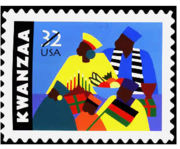The (IL)Legitimacy of Kwanzaa

Today marks the beginning of Kwanzaa, a week-long African American celebration of Pan African traditions. Kwanzaa consists of seven days of celebration, featuring activities such as candle-lighting and pouring of libations, and culminating in a feast and gift-giving. It was founded by Ron Karenga, and first celebrated in 1966. Karenga calls Kwanzaa the African American branch of "first fruits" celebrations of classical African cultures.
Karenga says that “it was chosen to give a Black alternative to the existing holiday and give Blacks an opportunity to celebrate themselves and history, rather than simply imitate the practice of the dominant society."
According to Wikipedia, it is a celebration that has its roots in the civil rights era of the 1960s, and was established as a means to help African Americans reconnect with what Karenga characterized as their African cultural and historical heritage by uniting in meditation and study around principles that have their putative origins in what Karenga asserts are "African traditions" and "common humanist principles."
There has been criticism of Kwanzaa's authenticity and relevance, and of the motivations of its founder, Karenga.
However the legitimacy of Kwanzaa has come into question…
There has been a despite over how many people celebrated Kwanzaa. It is unclear how many people celebrate the holiday. According to a marketing survey conducted by the National Retail Foundation in 2004, Kwanzaa is celebrated by 1.6% of all Americans (about 13% of all African-Americans), or about 4.7 million. In a 2003 interview Karenga asserted that 28 million people celebrate Kwanzaa. He has always maintained it is celebrated all over the world.
Kwanzaa has also been criticized because it is not a traditional holiday of African people, and because of its recent provenance, having been invented in 1966. The origins of Kwanzaa, however, are not secret, and are openly acknowledged by those promoting the holiday. It was never advanced as an indigenous, African celebration.
Other criticisms center on Karenga's criminal record, including having been convicted and jailed on charges of felonious assault and false imprisonment in a case concerning the torture of two women. The women were themselves African-American, which some critics, among them Les Kinsolving, feel detract from Karenga’s claim that he created Kwanzaa to celebrate and strengthen the unity of black people.
In 1999, syndicated columnist and now White House Press Secretary Tony Snow wrote that "There is no part of Kwanzaa that is not fraudulent.” and other conservative writers have remarked on the Marxist leanings of Karenga and some of the seven principles of Kwanzaa, questioning whether Kwanzaa should be taught in American schools.


0 Comments:
Post a Comment
<< Home